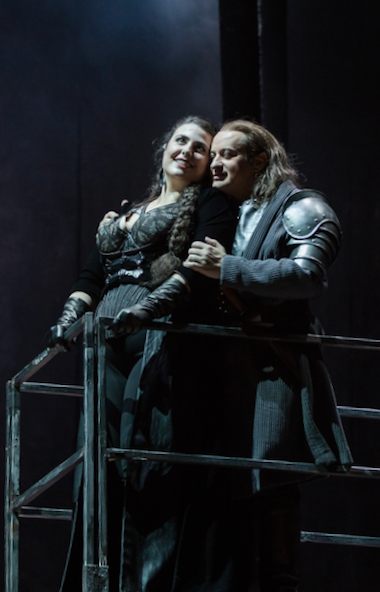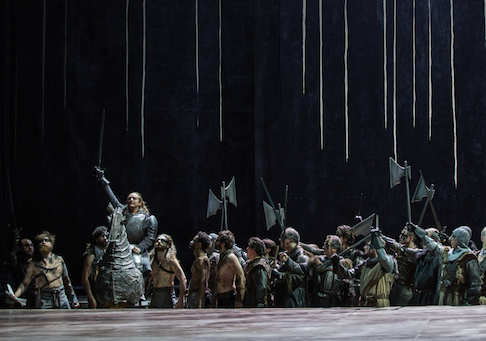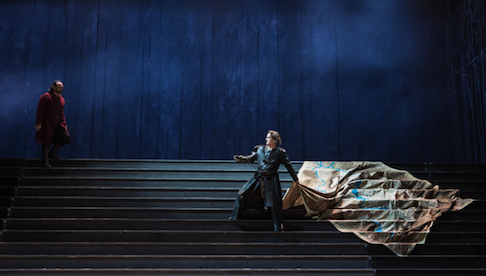
29 Jan 2018
The Bandits in Rome
AKA I masnadieri, rare early Verdi, though not as rare as Alzira. In 1847 London’s Her Majesty’s Theatre commissioned the newly famous Verdi to write this opera for the London debut of Swedish soprano Jenny Lind.
English Touring Opera are delighted to announce a season of lyric monodramas to tour nationally from October to December. The season features music for solo singer and piano by Argento, Britten, Tippett and Shostakovich with a bold and inventive approach to making opera during social distancing.
This tenth of ten Live from London concerts was in fact a recorded live performance from California. It was no less enjoyable for that, and it was also uplifting to learn that this wasn’t in fact the ‘last’ LfL event that we will be able to enjoy, courtesy of VOCES8 and their fellow vocal ensembles (more below …).
Ever since Wigmore Hall announced their superb series of autumn concerts, all streamed live and available free of charge, I’d been looking forward to this song recital by Ian Bostridge and Imogen Cooper.
The Sixteen continues its exploration of Henry Purcell’s Welcome Songs for Charles II. As with Robert King’s pioneering Purcell series begun over thirty years ago for Hyperion, Harry Christophers is recording two Welcome Songs per disc.
Although Stile Antico’s programme article for their Live from London recital introduced their selection from the many treasures of the English Renaissance in the context of the theological debates and upheavals of the Tudor and Elizabethan years, their performance was more evocative of private chamber music than of public liturgy.
In February this year, Albanian soprano Ermonela Jaho made a highly lauded debut recital at Wigmore Hall - a concert which both celebrated Opera Rara’s 50th anniversary and honoured the career of the Italian soprano Rosina Storchio (1872-1945), the star of verismo who created the title roles in Leoncavallo’s La bohème and Zazà, Mascagni’s Lodoletta and Puccini’s Madama Butterfly.
Evidently, face masks don’t stifle appreciative “Bravo!”s. And, reducing audience numbers doesn’t lower the volume of such acclamations. For, the audience at Wigmore Hall gave soprano Elizabeth Llewellyn and pianist Simon Lepper a greatly deserved warm reception and hearty response following this lunchtime recital of late-Romantic song.
Collapsology. Or, perhaps we should use the French word ‘Collapsologie’ because this is a transdisciplinary idea pretty much advocated by a series of French theorists - and apparently, mostly French theorists. It in essence focuses on the imminent collapse of modern society and all its layers - a series of escalating crises on a global scale: environmental, economic, geopolitical, governmental; the list is extensive.
For this week’s Live from London vocal recital we moved from the home of VOCES8, St Anne and St Agnes in the City of London, to Kings Place, where The Sixteen - who have been associate artists at the venue for some time - presented a programme of music and words bound together by the theme of ‘reflection’.
'Such is your divine Disposation that both you excellently understand, and royally entertaine the Exercise of Musicke.’
Amongst an avalanche of new Mahler recordings appearing at the moment (Das Lied von der Erde seems to be the most favoured, with three) this 1991 Mahler Second from the 2nd Kassel MahlerFest is one of the more interesting releases.
‘And there was war in heaven: Michael and his angels fought against the dragon; and the dragon fought and his angels, And prevailed not; neither was their place found any more in heaven … that old serpent … Satan, which deceiveth the whole world: he was cast out into the earth, and his angels were cast out with him.’
If there is one myth, it seems believed by some people today, that probably needs shattering it is that post-war recordings or performances of Wagner operas were always of exceptional quality. This 1949 Hamburg Tristan und Isolde is one of those recordings - though quite who is to blame for its many problems takes quite some unearthing.
There was never any doubt that the fifth of the twelve Met Stars Live in Concert broadcasts was going to be a palpably intense and vivid event, as well as a musically stunning and theatrically enervating experience.
‘Love’ was the theme for this Live from London performance by Apollo5. Given the complexity and diversity of that human emotion, and Apollo5’s reputation for versatility and diverse repertoire, ranging from Renaissance choral music to jazz, from contemporary classical works to popular song, it was no surprise that their programme spanned 500 years and several musical styles.
The Academy of St Martin in the Fields have titled their autumn series of eight concerts - which are taking place at 5pm and 7.30pm on two Saturdays each month at their home venue in Trafalgar Square, and being filmed for streaming the following Thursday - ‘re:connect’.
The London Symphony Orchestra opened their Autumn 2020 season with a homage to Oliver Knussen, who died at the age of 66 in July 2018. The programme traced a national musical lineage through the twentieth century, from Britten to Knussen, on to Mark-Anthony Turnage, and entwining the LSO and Rattle too.
With the Live from London digital vocal festival entering the second half of the series, the festival’s host, VOCES8, returned to their home at St Annes and St Agnes in the City of London to present a sequence of ‘Choral Dances’ - vocal music inspired by dance, embracing diverse genres from the Renaissance madrigal to swing jazz.
Just a few unison string wriggles from the opening of Mozart’s overture to Le nozze di Figaro are enough to make any opera-lover perch on the edge of their seat, in excited anticipation of the drama in music to come, so there could be no other curtain-raiser for this Gala Concert at the Royal Opera House, the latest instalment from ‘their House’ to ‘our houses’.
"Before the ending of the day, creator of all things, we pray that, with your accustomed mercy, you may watch over us."

AKA I masnadieri, rare early Verdi, though not as rare as Alzira. In 1847 London’s Her Majesty’s Theatre commissioned the newly famous Verdi to write this opera for the London debut of Swedish soprano Jenny Lind.
And to this day “Tu del mio Carlo al seno” and its cabaletta remain a showpiece for sopranos, not to mention the “Parea mi che sorto da lauto convito” that is a blockbuster showpiece for baritones. There is even a greater amount of splendid music for tenor, starting with the opera’s initial scene “O mio castel paterno” that creates the situation that will result in the brutal murder of the soprano.
Just now in Rome the tenor Carlo, yearning for his childhood home, was sequestered up on some sort of rolling scaffold on the side of the stage for this first scene (and most of the opera), but upon learning that his father has disinherited him he vowed to remain in a band of robbers who plunder the countryside (and in this production brutally rape women). The robbers rose magically on one of Teatro Costanzi’s famous full stage elevators and he agreed to become their leader.
 Carlo (Stefano Secco) becoming leader of Verdi's bandits
Carlo (Stefano Secco) becoming leader of Verdi's bandits
Meanwhile we learn that the baritone had deceived the tenor. The tenor had not been disinherited after all, he could in fact have renounced his dissolute life and returned home. The problem now becomes the tenor’s sworn loyalty to his band of robbers, not to mention that the soprano from his former upright life loves him. Unfortunately the conniving baritone wants to marry her. So there was a lot to sing about.
The metteur en scène of this new production was popular 57 year-old Italian actor and voiceover artist (for dubbing films) Massimo Popolizio. Mr. Popolizio made his directorial debut only last year with Author Miller’s 1968 play The Price. Mr. Popolizio is said to have based his staging of The Bandits on the popular U.S. TV series Game of Thrones. Maybe this explains the several scenes of gratuitous gang rape. Unlike the well developed threads of Game of Thrones, Mr. Popolizio left Verdi’s admittedly worst libretto without a discernible story line. We will never know from Mr. Popolizio why Carlo (the tenor) murdered Amalia (the soprano) just after their ardent declaration of love.
It was an an evening about singing, not about theater. After overcoming quite deserved opening night nerves the mostly Italian cast sang stylishly. Unfortunately tenor Stefano Secco (San Francisco’s 2014 Pinkerton) as Schiller’s questionable hero Carlo did not deliver the opening scene with sufficient pizazz to impress the audience which, despite his intense and eloquent (though small scale) delivery of the third act, awarded him vociferous boos at the final bows.
Twenty-nine year old ingenue diva Roberta Mantegna, a recent graduate of Rome Opera’s new young artist program, negotiated Amalia’s treacherous outpourings with knowing aplomb, belying the fact that this was her debut in a major role on a major stage. Additional maturity of voice will add effect to her Amalia.
 Francesco (Artur Ruciński) beginning “Parea mi che sorto da lauto convito”
Francesco (Artur Ruciński) beginning “Parea mi che sorto da lauto convito”
Polish baritone Artur Ruciński, San Francisco Opera’s recent Germont, gave an impressive account of the repentant Francesco’s big scene, his fine diction finding its intimacy rather than its bravura. The role of Massimiliano, Carlo and Francesco’s feeble father, was competently delivered by ubiquitous bass Ricardo Zanellato.
Conductor Roberto Abbado exhibited little affection for early Verdi, and had no patience for attempting ensemble in the extended scenes with the male chorus.
Michael Milenski
Cast and production information:
Massimiliano: Riccardo Zanellato; Carlo: Stefano Secco; Francesco: Artur Ruciński; Amalia: Roberta Mantegna; Arminio: Saverio Fiore; Moser: Dario Russo; Rolla: Pietro Picone. Orchestra and Chorus of the Teatro dell’opera di Roma. Conductor: Roberto Abbado; Metteur en scène: Maurizio Popolizio; Set designer: Sergio Tramonti; Costumres: Silvia Aymonino; Lighting: Robert Venturi. Video: Luca Brinchi and Daniele Spanò. Teatro Costanzi. Rome, January 21, 2018